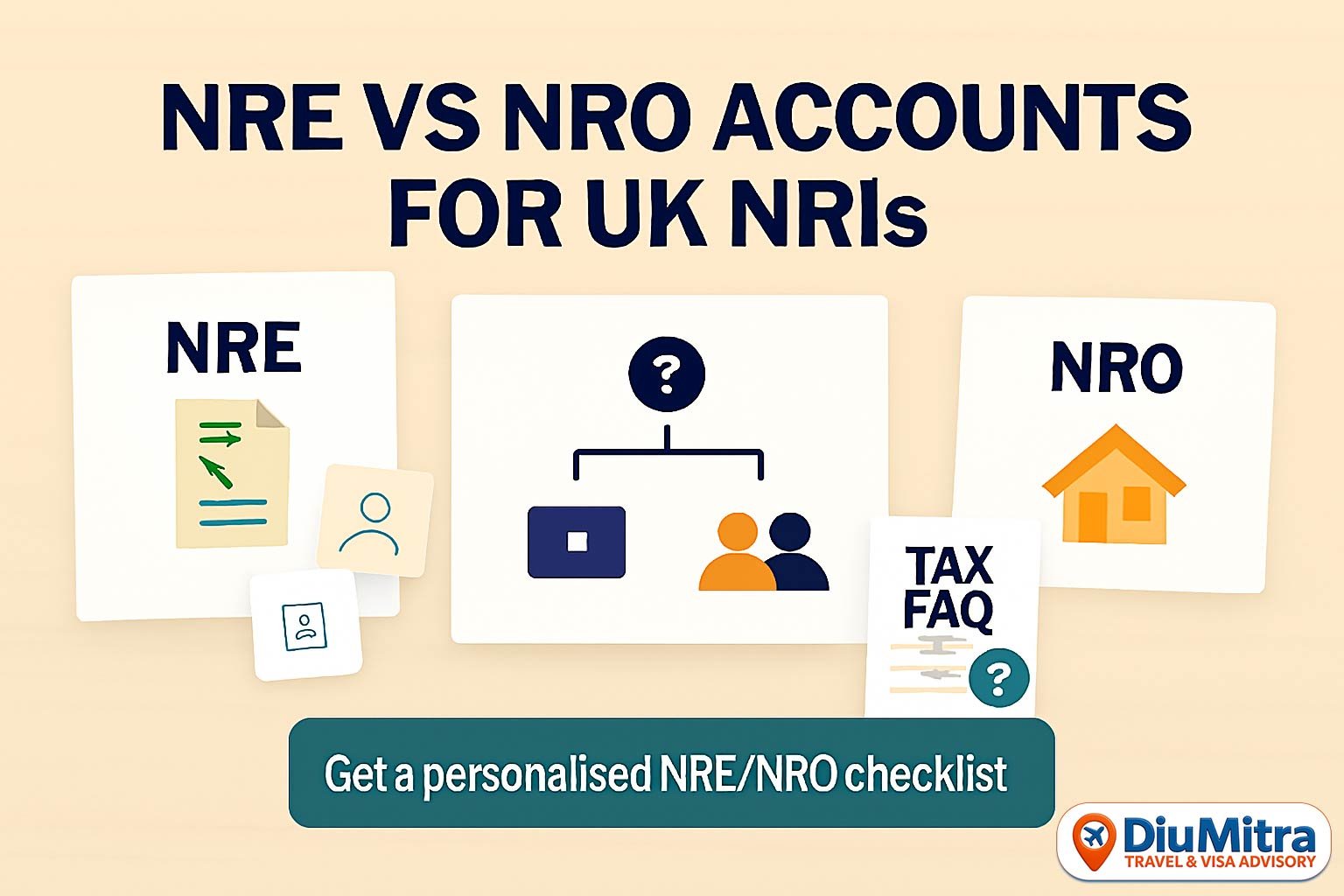
For many Indian-origin families living in the UK, banking in India remains essential. Whether it’s sending UK salary back home, managing rental income from Indian property, or supporting parents financially, choosing the right account matters. That’s where understanding NRE vs NRO accounts for UK NRIs becomes crucial — because the wrong choice can lead to tax deductions, transfer limits, and compliance problems.
In this in-depth guide, we explain the difference between NRE and NRO accounts, who should use which account, repatriation rules, documents required, tax FAQs, real-world scenarios, and common mistakes to avoid. If you’re confused between NRE vs NRO accounts for UK NRIs, this guide will help you decide with confidence.
What Are NRE vs NRO Accounts for UK NRIs? (Simple Explanation)
Both accounts are designed under India’s FEMA rules to help NRIs manage money between India and abroad — but they serve very different purposes.
What Is an NRE Account?
An NRE (Non-Resident External) account is used to deposit foreign income earned outside India, such as:
- UK salary
- Overseas business income
- Freelance or professional earnings earned abroad
Key features:
- Funds are converted to INR and held in India
- Interest is tax-free in India
- Money is fully repatriable back to the UK
This makes NRE accounts ideal when transferring UK earnings into India.
See official RBI guidance on NRE accounts here
What Is an NRO Account?
An NRO (Non-Resident Ordinary) account is used to manage income generated inside India, such as:
- Property rent
- Dividends and investments
- Indian pensions or savings interest
Key features:
- Funds are in INR
- Repatriation is restricted to USD 1 million/year (with documentation)
- Interest is taxable in India (≈30% TDS)
Read RBI rules on NRO accounts
Key Differences — NRE vs NRO Accounts for UK NRIs
|
Feature |
NRE Account |
NRO Account |
|---|---|---|
|
Source of Funds |
Overseas income (UK salary) |
Income earned in India |
|
Repatriation |
100% free & unlimited |
Limited to USD 1M/year with CA clearance |
|
Tax on Interest |
Tax-free in India |
Taxable (≈30% TDS) |
|
Joint Holding |
With another NRI |
With NRI or Indian resident |
|
Best For |
Sending foreign income to India |
Managing income generated in India |
For most UK NRIs with both UK salary and Indian income, banks recommend maintaining both NRE and NRO accounts.
Documents Required for NRE vs NRO Accounts (UK NRIs)
To open either account from the UK, banks generally require:
- Indian passport + UK BRP/visa
- Proof of NRI / OCI / PIO status
- PAN card
- UK address proof (utility bill or bank statement)
- Passport-size photos
- Completed bank KYC form
For NRO repatriation, additional documents are needed:
- Form 15CA / 15CB
- Chartered Accountant certificate
- Tax payment or TDS proof
NRE vs NRO Accounts for UK NRIs — Which One Should You Use? (Scenarios)
To help you decide practically, here are real-world situations.
Scenario 1 — Sending UK Salary to India
✔ Best account: NRE account
- Money originates abroad
- You may need to send funds back later
- Interest remains tax-free in India
Scenario 2 — Receiving Rent from Indian Property
✔ Best account: NRO account
- Income is generated in India
- Bank deducts tax at source (TDS)
- You may later repatriate funds using Form 15CA/CB
Scenario 3 — Supporting Parents in India
✔ Best account: NRE account
- You transfer UK earnings
- Money remains freely repatriable
Scenario 4 — Receiving Pension or Dividends in India
✔ Best account: NRO account
- Income is Indian-sourced
- Taxable under Indian rules
Scenario 5 — UK Salary + Indian Rental Income
✔ Best option: Maintain both NRE & NRO
- NRE for foreign income
- NRO for local Indian income
- Keeps tax and compliance separate
This is the most common setup for NRE vs NRO accounts for UK NRIs.
Mini Tax FAQ — NRE vs NRO Accounts for UK NRIs
Learn more about UK-India DTAA
Decision Tree — NRE vs NRO Accounts for UK NRIs
- Earning abroad (UK salary)? → NRE
- Earning in India? → NRO
- Earning from both? → Open both NRE & NRO
It’s that simple — use the account that matches the source of funds.
Common Mistakes to Avoid
- Using an NRE account for Indian income (not allowed)
- Forgetting Form 15CA/CB before NRO remittance
- Not converting resident savings account to NRO after moving abroad
- Assuming NRO interest is tax-free
- Not updating UK address in bank KYC
NRE vs NRO Compliance & Legal Obligations (UK NRIs)
Under FEMA rules, once you become an NRI:
- Your resident savings account must be converted to NRO
- Income earned abroad must not be deposited into NRO
- Indian-sourced income must not be deposited into NRE
Banks may freeze accounts in case of violations.
If you are unsure, seek advisory guidance before transferring funds.
NRE vs NRO Accounts for UK NRIs — Pros & Cons Summary
NRE Account — Pros
- Tax-free interest
- Unlimited repatriation
- Ideal for UK salary transfers
NRE Account — Cons
- Cannot receive Indian income
NRO Account — Pros
- Designed for Indian income
- Allows joint holding with resident family
NRO Account — Cons
- Taxable interest
- Repatriation requires documentation
How to Choose the Right Bank for NRE & NRO
When comparing banks, evaluate:
- Exchange rates & transfer charges
- Online banking availability for NRIs
- UK branch support
- Repatriation process turnaround time
- Minimum balance requirements
Major banks offering NRE/NRO for UK NRIs include:
When Should You Hold Both NRE and NRO Accounts?
You should maintain both accounts if:
- You earn income in both the UK and India
- You receive rent or dividends in India
- You transfer UK salary to India for savings
This structure helps keep taxation clear and compliant.
Frequently Asked Questions
Need Help Choosing Between NRE vs NRO Accounts for UK NRIs?
If you’re unsure which account suits your situation, professional advisory support can:
- Review your financial situation
- Help you choose between NRE vs NRO accounts for UK NRIs
- Explain tax & repatriation rules clearly
- Reduce compliance risks
⚠️ Disclaimer: Guidance is advisory only. We do not act as financial or legal representatives. Banking and compliance decisions remain the responsibility of the individual.






